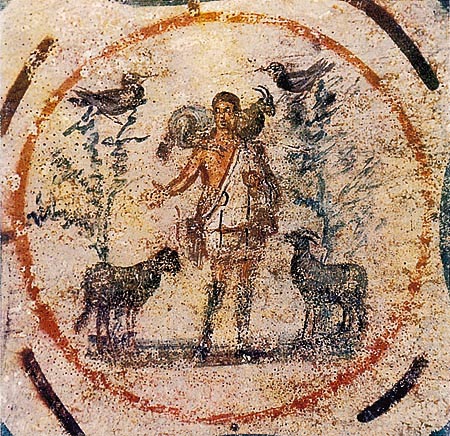The significance of leadership and organisation in the spread of Christianity
By Dimitris J. Kyrtatas
The Spread of Christianity in the First Four Centuries: Essays in Explanation, edited by W. V. Harris (Brill, Leiden and Boston 2005)

Introduction: In his magisterial work The Decline and Fall of the Roman Empire, Edward Gibbon provides his readers with a comprehensive and, if I may say so, up-to-date account of ‘The Progress of the Christian Religion’. In this account, as everyone who has read it will recall, Gibbon gives one primary and five secondary causes for the spread of Christianity in the three first centuries of its history. This multifaceted approach covers almost all the topics that subsequent historians have either explicitly proposed or implied as possible causes. Since the publication of this book many scholars have often stressed one or the other of these causes as the most important in the history of Christian expansion. Hence it is reasonable to ask whether any real progress has been achieved since 1776.
I take this observation as reassuring. It reminds me that not everything that historians say is ephemeral and subjective. Students of the ancient Greek and Roman world may not consider Herodotus, Thucydides, Livy and Tacitus as their real colleagues any longer, but they can honestly converse with a scholar who was active more than two centuries ago. Actually, by being multifaceted, Gibbon’s approach may even be better than some more recent ones that seek to find the compelling factor which explains the success of Christianity in the content of its doctrine. For if we agree that Christianity triumphed for a variety of reasons this means that we may have already provided the essentials of the answer required — an answer that can only be worked out by the historian who deals with the complexities of a specific society, not by a theologian who restricts himself to abstract concepts and to the unshakable belief that Christianity followed a one–way path to triumph.


 It is of course true that Gibbon’s primary cause is presented as a sufficient one. While considering ‘by what means the Christian faith obtained so remarkable a victory over the established religions of the earth’, he was led to the ‘obvious and satisfactory’, as he calls it, answer that ‘it was owing to the convincing evidence of the doctrine itself,and to the ruling providence of its great Author’. However, no sooner had he expressed this view, than he clarified that by thus saying he was merely paying lip service to the pious Christian mentality of his times. ‘But as truth and reason’, he hastens to add with his usual irony, ‘seldom find so favourable a reception in the world … we may still be permitted … to ask … what were the secondary causes of the rapid growth of the Christian church’ — causes to which I shall presently turn.
It is of course true that Gibbon’s primary cause is presented as a sufficient one. While considering ‘by what means the Christian faith obtained so remarkable a victory over the established religions of the earth’, he was led to the ‘obvious and satisfactory’, as he calls it, answer that ‘it was owing to the convincing evidence of the doctrine itself,and to the ruling providence of its great Author’. However, no sooner had he expressed this view, than he clarified that by thus saying he was merely paying lip service to the pious Christian mentality of his times. ‘But as truth and reason’, he hastens to add with his usual irony, ‘seldom find so favourable a reception in the world … we may still be permitted … to ask … what were the secondary causes of the rapid growth of the Christian church’ — causes to which I shall presently turn.
Click here to read this article from Academia.edu
Sponsored Content


The significance of leadership and organisation in the spread of Christianity
By Dimitris J. Kyrtatas
The Spread of Christianity in the First Four Centuries: Essays in Explanation, edited by W. V. Harris (Brill, Leiden and Boston 2005)
Introduction: In his magisterial work The Decline and Fall of the Roman Empire, Edward Gibbon provides his readers with a comprehensive and, if I may say so, up-to-date account of ‘The Progress of the Christian Religion’. In this account, as everyone who has read it will recall, Gibbon gives one primary and five secondary causes for the spread of Christianity in the three first centuries of its history. This multifaceted approach covers almost all the topics that subsequent historians have either explicitly proposed or implied as possible causes. Since the publication of this book many scholars have often stressed one or the other of these causes as the most important in the history of Christian expansion. Hence it is reasonable to ask whether any real progress has been achieved since 1776.
I take this observation as reassuring. It reminds me that not everything that historians say is ephemeral and subjective. Students of the ancient Greek and Roman world may not consider Herodotus, Thucydides, Livy and Tacitus as their real colleagues any longer, but they can honestly converse with a scholar who was active more than two centuries ago. Actually, by being multifaceted, Gibbon’s approach may even be better than some more recent ones that seek to find the compelling factor which explains the success of Christianity in the content of its doctrine. For if we agree that Christianity triumphed for a variety of reasons this means that we may have already provided the essentials of the answer required — an answer that can only be worked out by the historian who deals with the complexities of a specific society, not by a theologian who restricts himself to abstract concepts and to the unshakable belief that Christianity followed a one–way path to triumph.
Click here to read this article from Academia.edu
Sponsored Content